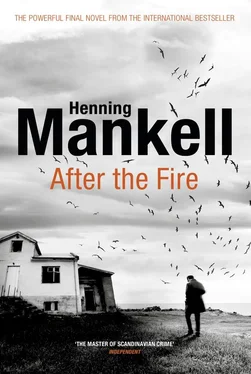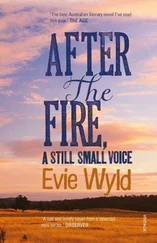I went in to join the two police officers, who were gazing down at Oslovski.
‘There’s a wound on her head,’ the female officer said.
‘She would have sustained that when she fell,’ I said. ‘If you have a massive stroke you go down like a bird that’s been shot.’
‘We’d better take a look in the house,’ the other officer said.
‘She usually carries her keys in her pocket,’ I said.
I waited on the veranda. They rummaged around in the house for a while and came out when they had found her ID card.
‘The way some people live,’ the woman said.
I didn’t reply. I gave them my details, locked my car and walked down to the quayside. Another doctor would come to certify the death. While I was waiting for Jansson I did some food shopping and bought a newspaper. The cafe was open, so I decided to have breakfast.
As soon as I saw Veronika, I realised she didn’t know about Oslovski. She hadn’t seen or heard the ambulance or the police car.
‘You’re early,’ she said with a smile. ‘Coffee? I can’t honestly recommend the Mazarins!’
‘Come and sit down,’ I said, pointing to a table by the window.
She looked puzzled.
‘Rut is dead,’ I explained. ‘Rut Oslovski. I found her in the garage, where she’d been working on her old car. They’ll be taking her body away shortly.’
Veronika recoiled, as people do when something unexpected has occurred. Her eyes filled with tears. I knew she was one of the few people Oslovski used to talk to. They might only have chatted about the weather, but at least they had a conversation.
‘But what on earth has happened?’
‘She was lying on the floor with a spanner in her hand. I’m guessing she had a stroke or a haemorrhage. She hadn’t been attacked, anyway.’
We sat there talking quietly, neither of us really able to process the morning’s events. Veronika brought coffee, along with sandwiches defrosted from the previous day.
‘She was lonely,’ Veronika said.
‘Lately I had a feeling she was frightened,’ I said.
Veronika frowned. ‘What do you mean?’
‘I thought she’d changed.’
‘She was always frightened, all the years I knew her.’
‘Do you know why? Did she ever say anything?’
‘No.’
‘But what do you think?’
‘I don’t know. I suppose you can be scared without knowing why.’
‘Where did she come from?’
‘I’ve no idea. There was always something...inaccessible about her.’
‘She repaired jetties and worked on her car. Who was she really?’
‘I don’t know.’
Jansson would be here soon. I wanted to distract Veronika before I left.
‘How’s the woman who won twenty-five thousand kronor a month for twenty-five years getting on?’
‘Just because you have an arsehole it doesn’t mean you have to be one,’ Veronika said pensively. ‘But that’s exactly what she is. She’s boasting about the fact that she’s going to spend the winters in Thailand.’
I’d never heard Veronika talk that way before. As far as I was concerned, she had always been the quiet owner of the cafe, but now she was suddenly something different. Something more. I was embarrassed.
I saw Jansson’s boat approaching and got up to leave. Veronika was lost in thought.
‘We’ll miss her,’ I said.
She nodded but didn’t say anything.
Jansson was waiting on the quayside.
‘Is it really true? Is Oslovski dead?’
‘You don’t know me very well if you think I’d lie about something like that.’
He pulled a face. ‘There are too many people dying. It’s like an epidemic.’
‘It’s just coincidence,’ I said. ‘Death is breathing down the back of our necks, but no one knows when the blow will fall.’
I stowed my bag and my groceries in the boat. I didn’t want to make this conversation any longer than necessary; I wanted to get home to my caravan. Jansson understood; he cast off and clambered aboard with some difficulty. That particular activity exposes the ageing process. About five years ago I had discovered that I could no longer leap easily into my boat without losing my balance. My joints had grown stiffer. Old age has arrived when you can no longer jump aboard. I watched as Jansson shuffled along, almost hating those stiff joints of his, and reversed away from the quayside. I sat in the prow, hunched against the wind and the autumn chill.
We travelled to my island in silence. Once again I was surprised not to see the house among the bare trees. I still hadn’t managed to get used to the blackened ruin.
Jansson skilfully hove to. The ability to come alongside a jetty with a barely noticeable bump hadn’t left the former postman. I lifted my bags ashore and was about to give Jansson his hundred-kronor note when he took off his cap. I knew this meant that he wanted to say something.
‘What do you want? Can’t it wait? I’ve had a long journey — I’m tired.’
‘My heart feels funny. I’m frightened.’
Under normal circumstances, when Jansson turns up with his aches and pains and asks me to examine him, I know from the start that it’s all in his mind. But this morning it was different. I nodded in the direction of the bench and climbed out of the boat. Jansson followed suit. I went into the boathouse and fetched my stethoscope. When I came out he was already taking off his thick jacket.
‘Take off your shirt and jumper too,’ I said.
Jansson did as I asked. He sat there, naked to the waist, his skin covered in goose bumps in the cold wind. I listened to his lungs and his heart, asked him to take deep breaths. His lungs sounded fine, but as soon as I picked up his heartbeat, I knew there was something wrong. I must have checked Jansson’s heart a hundred times over the years; I had never had any cause for concern. But now it was different: I could definitely hear an arrhythmia.
As I stepped back I could see the fear in his eyes. Jansson had become an old man.
‘It might be a good idea if you pop into the clinic, ask them to do an ECG,’ I said.
‘Is it serious?’
‘Not necessarily. It might be nothing, but at our age it’s a good idea to have an ECG now and again.’
‘Is it fatal?’
‘If you don’t go to the clinic, it could be. Put on your clothes and go home; tomorrow you can take the bus into town. The clinic will look after you.’
Jansson got dressed in silence as I put the stethoscope away. I came out of the boathouse to find him bent forward on the bench, hands clasped as if he had suddenly felt the need to say a prayer. He looked up at me as the door creaked shut.
‘Why don’t you tell me the truth?’
‘I am telling you the truth. You need to go to the clinic. Don’t worry unnecessarily. I just picked up a little murmur; I’m sure there’s an explanation, and medication can work wonders these days.’
‘I’ve been reading about the heart,’ he said. ‘It starts beating long before we’re born. I think a lot of people believe that doesn’t happen until the umbilical cord is cut.’
‘It happens on the twenty-eighth day,’ I said. ‘That amazing muscle starts working on the twenty-eighth day, and after that it usually stops only once. Death is the end of a race, after all, but we don’t charge through and break a tape. If the heart were a bird with wings, you could well have flown to the moon and back several times before it decides that it’s time for those wings to rest.’
Jansson nodded. I realised he knew all about the wonderful heart muscle’s life and death.
We sat in silence on the bench, two old men in a spot meant for major and minor truths. Jansson was sixty-nine years old, I was seventy. So together we were one hundred and thirty-nine. If I counted back in time, that took us to 1875, when surgeons operated wearing a starched collar, sometimes evening dress.
Читать дальше












